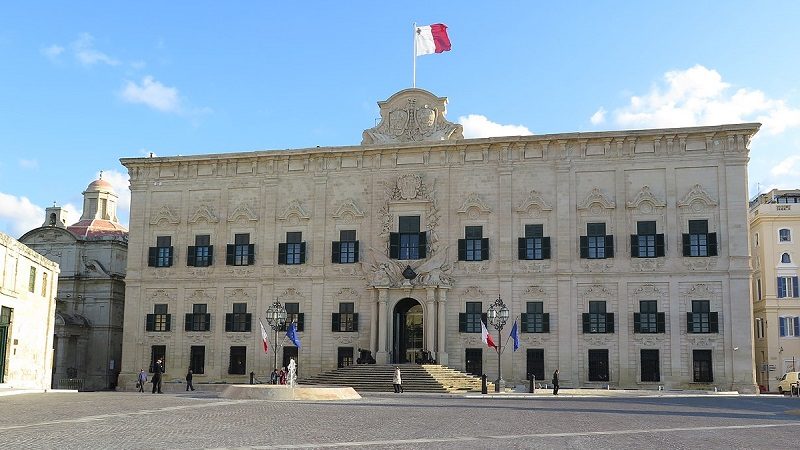The rule of law is one of those concepts that while essential to the functioning of a true liberal democracy is notoriously hampered by the lack of a clear definition.
People clearly recognise the point when an autocrat takes over with overt force such as a military coup. But few will recognise the actions of a populist autocratic movement that slowly undermines the rule of law, all the while claiming to act in accordance with “the will of the majority / the people”, claiming that “critics are in the minority” or re-framing valid criticism as solely politically motivated or partisan.
Countries such as Malta, without any tradition of civic engagement or form of civic skills training as part of their national curriculum, are particularly susceptible both to accepting far more abuses as well as to misinformation or outright disinformation on the rule of law.
https://www.facebook.com/TheShiftNews/videos/507355513008313/
Attack the messenger
It falls upon the legal profession, who are trained to spot and also directly exposed to the effects of abuses or institutional decay, to speak up. And they did speak up in May, 2017, in the run up to the general election. Faced with spin, deflection and inertia, a group of lawyers calling themselves the Advocates for the Rule of Law saw fit to highlight the inertia and deflection when it came to institutions investigating any wrongdoing by politicians or political appointees.
Before the ink on the full-page adverts paid for by these lawyers even dried, the government and Labour Party had already created a counter-narrative. On 11 May, 2017, an editorial in L-Orizzont (associated with the Labour Party) branded this group of lawyers as “partisan”.
A false narrative was created that they were doing this to ensure that former PN Leader Simon Busuttil retained the cash for passport scheme called the Individual Investor Programme (IIP). None of the lawyers forming part of this pressure group were in fact involved in the sale of passports.
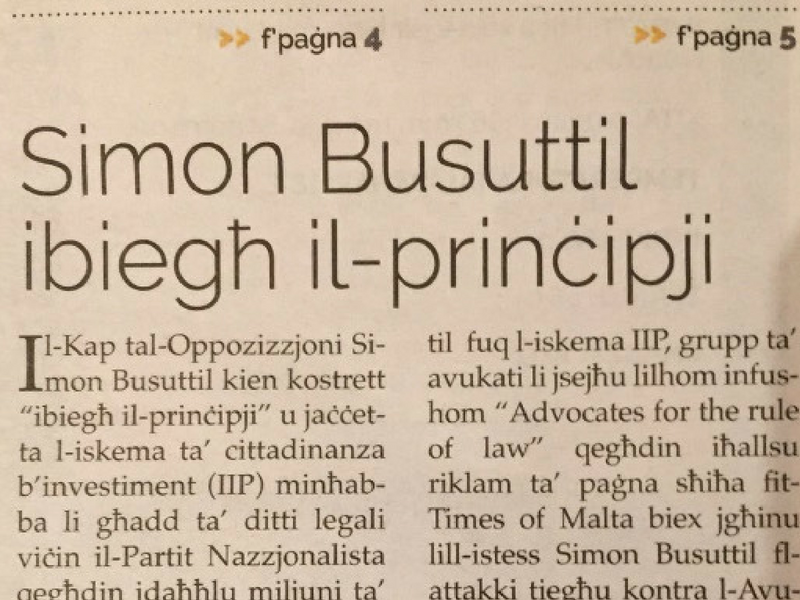
The branding of any critics as “partisan” continues, as in this post by Cyrus Engerer listing the people the MEPs were scheduled to meet during their visit to Malta at the end of last year. The Prime Minister’s ‘Special Envoy’ to the EU, a post Joseph Muscat gave him after he was found guilty of spreading revenge porn photos of his ex-boyfriend, fabricated lies about the individuals involved to discredit them and to diminish the seriousness of the MEPs’ visit (and discredit their eventual findings) in one stroke.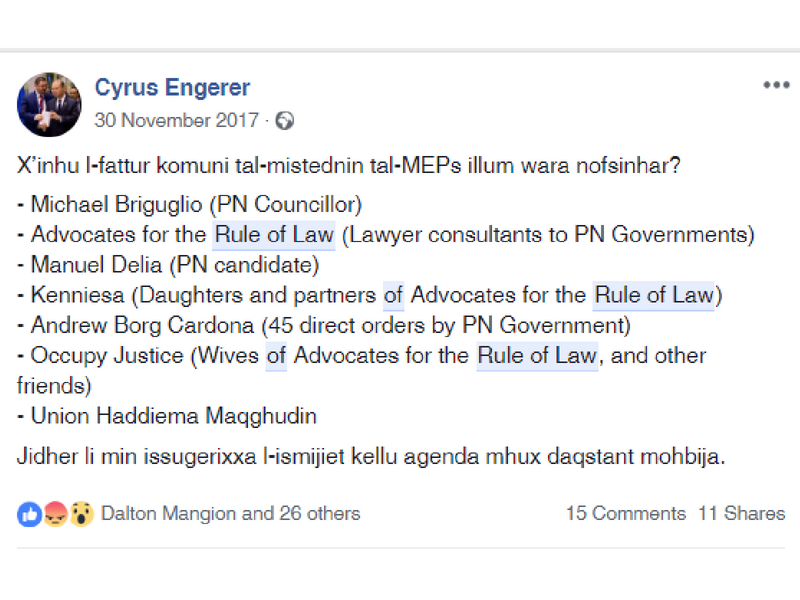 Two weeks before Daphne Caruana Galizia’s assassination in October, 2017, then Chief Justice Silvio Camilleri saw the need to highlight concerns with the rule of law in Malta during an opening ceremony.
Two weeks before Daphne Caruana Galizia’s assassination in October, 2017, then Chief Justice Silvio Camilleri saw the need to highlight concerns with the rule of law in Malta during an opening ceremony.
The Prime Minister’s reaction? He disagreed with Chief Justice’s “interpretation” of the matter.
But that was just the formal reaction. Separately, a series of opinion pieces and letters to the editor by people ranging from Justice Minister Owen Bonnici to Anna Mallia, an adjudicator in Freedom of Information appeals and Alfred Mifsud’s niece, pounced on the Chief Justice for daring express a view.
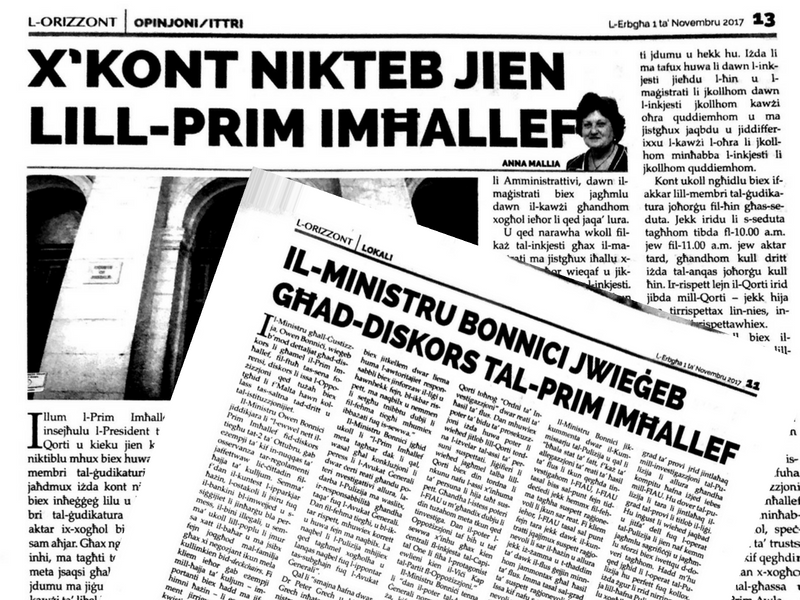
With Caruana Galizia’s assassination placing a fresh spotlight on Malta’s rule of law concerns and the European Parliament’s LIBE Committee deciding to send a fact-finding mission to Malta, a new narrative was adopted.
Now the fact-finding mission was being “driven by [Socialist MEP] Ana Gomes because abortion is not legal in Malta”; “a farce planned by the Nationalist Party” or “just a ploy for the MEPs to make a name for themselves at Malta’s expense”.
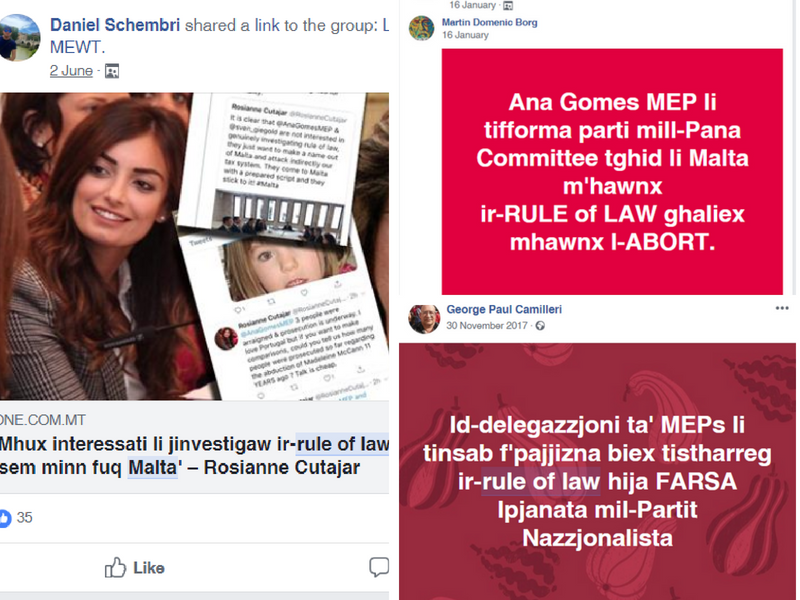
Reframe criticism as an attack on the country rather than the government
In July, 2017 and following the PANA Committee’s report on Malta, the European Parliament organised a plenary debate which turned into a grilling of Prime Minister Joseph Muscat about the rule of law in Malta and his ministers and appointees’ involvements in the Panama Papers.
During that session, Joseph Muscat stuck resolutely to his line that criticism was exclusively politically motivated, engaged in blatant pinkwashing and flouted legislation such as the removal of prescription for corruption by politicians (does not cover money laundering or chiefs of staff) or the Whistleblower Act (does not work in practice without political approval) as examples of the rule of law.
At home, the government adopted a different spin, rather than noting that it was Muscat and his government whose impunity and disregard for the rule of law was being criticised, Muscat was portrayed as defending Malta against “foreigners” envious of our success and tax system.
Muscat had previously used a similar tactic to defend against criticism arising from the Malta Files. In this case, rather than note that his and his government’s actions have jeopardised Malta’s standing and reputation and take action to remedy it, Muscat’s tactic was to reframe his role as the defender of Malta. This is a tactic borrowed straight from the nationalism rulebook 101 distracting people away from the underlying reason for the criticism and getting them to rally behind the (typically) autocratic leader in turning against the source.
This same tactic was later again used in relation to Paradise Papers.
The same “us against the foreigner” nationalistic narrative continues to this day.
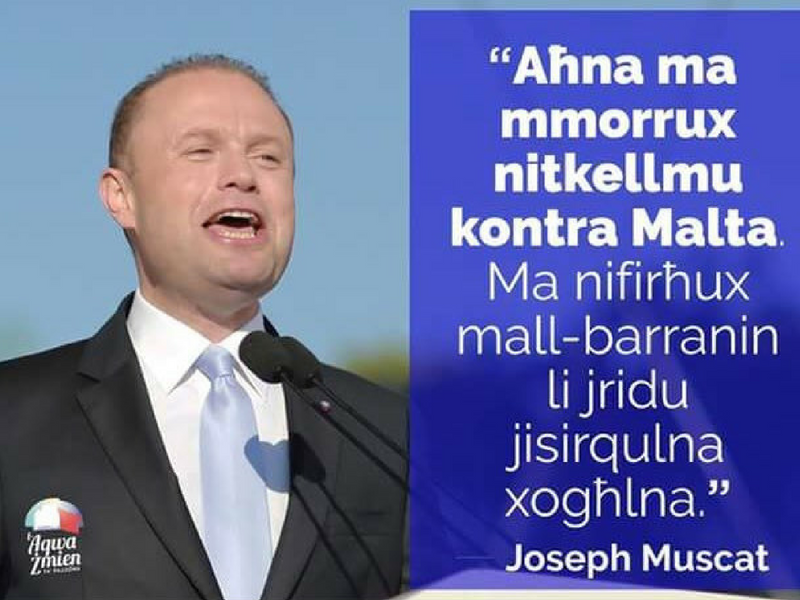
“We don’t speak against Malta. We don’t celebrate when foreigners want to steal our jobs” – Joseph Muscat
This narrative allows the branding of internal critics as “traitors”.

Prime Minister’s consultant Tony Zarb lashes out at Socialist MEP Ana Gomes.
Engage in whataboutism
Increasingly the government’s favourite propaganda tactic is whataboutism – the use of false comparisons to excuse their failings – to rebut any criticism about the rule of law.
This was applied in Malta, by recalling episodes dating back 50 years under a previous Labour government… or in matter that have nothing to do with the rule of law.

There is an consistent and intentional effort to twist the meaning of the rule of law, going as far as blaming civil society activists for “not observing the rule of law” when clamping down on their right to freedom of expression. This is a total distortion of the term.
Read more: Back to basics – what is the rule of law?
Home Affairs Minister Michael Farrugia also joined the chorus, falsely accusing activists of hypocrisy when he was the one turning the rule of law on its head.
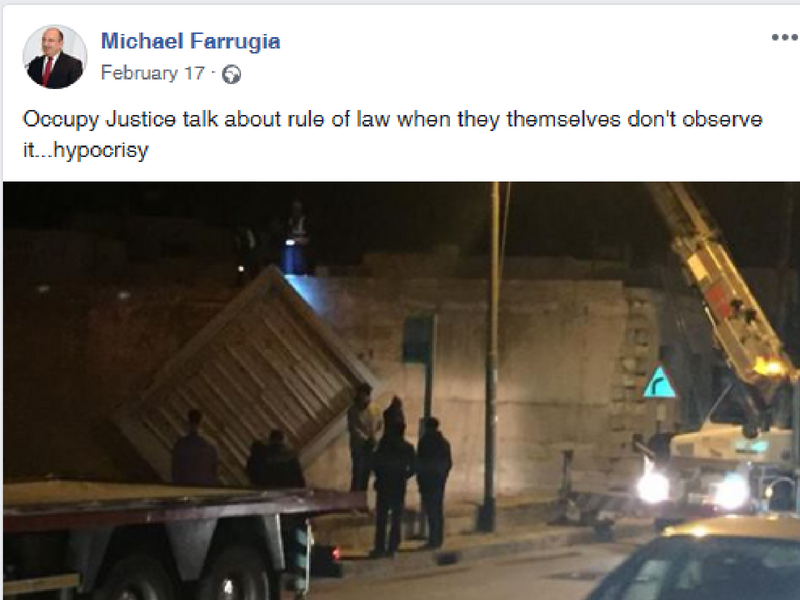
Matters hit rock bottom though with Rosianne Cutajar using the Madeleine McCann case in Portugal 11 years ago as a false equivalence to Malta’s political impunity in the face of corruption, the broad-daylight assassination of a journalist and failure to ensure a thorough and impartial investigation.
Whitewashing through misinformation
Faced with increasing criticism and pressure over the state of the rule of law in Malta, the government took to whitewashing.
Over the past four years, the government has increasingly publicised any positive periodic release by rating agencies, swiftly issuing a DOI press release providing an often selective snapshot of the rating agency’s report. Nowhere is this selective snapshot more evident than in relation to the rule of law.
Few people are aware of what rating agencies’ reports actually say particular given the prohibitive costs to acquire them, let alone the methodologies used for sovereign ratings. Rating agencies do not assess the rule of law, institutional strength or corruption in a country but instead rely on external indicators such as data from the World Justice Project Index, the World Bank’s Worldwide Governance Indicators (WGI) and Transparency International’s Corruption Perception Index.
Being a small country, Malta is not ranked in the World Justice Project Index and any surveys or updates to rankings in the WGI or Transparency International Index are either outdated or not entirely representative.
This is a fact noted as recently as August, 2018 where Moody’s noted that: “quantitative indicators, such as the Worldwide Governance Indicators, overstate the extent of Malta’s institutional strength, which remains constrained by its small size.”
Undeterred by accuracy, the government consistently issues press releases which later get picked up by the media and turned into articles either selectively quoting or outright misquoting rating agencies as giving Malta’s rule of law a “clean bill of health”.

To quote two sections from Moody’s actual full report for August 2018 that were not mentioned in the government’s press releases about that report:
“Concerns over the rule of law in Malta remain in the wake of the killing of Ms Caruana Galizia, with the subject notably attracting scrutiny by the European Parliament and the Parliamentary Assembly of the Council of Europe. Concerns over breaches of anti-money laundering and combatting the financing of terrorism (AML/CFT) regulations have also been raised with the closure earlier this year of Pilatus Bank (which was also implicated in the Egrant affair) due to allegations by U.S. authorities of breaches of sanctions against Iran. The European Banking Authority separately this year found that Malta’s financial supervisory authorities had broken EU law in its supervision of Pilatus and urged the authorities to remedy the identified shortcomings in their AML/CFT supervision”.
Moody’s specifically mentions “evidence of an erosion of institutional strength, in particular in relation to the rule of law or control of corruption” as being grounds for a downgrade.
Blur the meaning
Since the rule of law is seen by the ordinary citizen, particularly younger generations without any formal civic skills training or life experience, as an abstract concept it is ripe for misinformation or twisting.
Nowhere is this clearer than in Vladimir Putin’s interpretation of the rule of law:
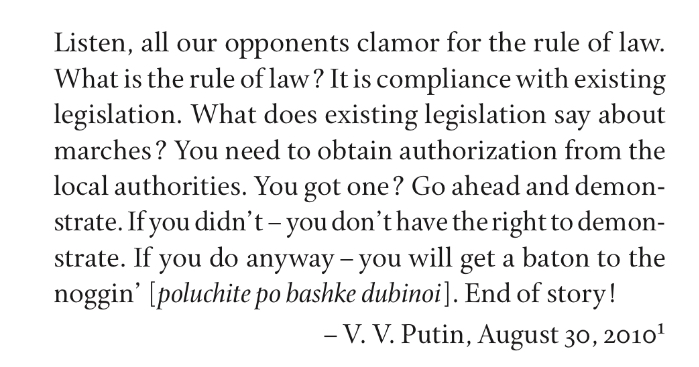
The government and Labour Party propagandists are equally swift to offer varying interpretations of the rule of law to suit an alternative narrative.
One of the most bizarre was by the Prime Minister himself who implied that calls for the Attorney General and Police Commissioner (who arguably long abdicated from their constitutional duties) to resign and for the government to consider appointing persons with bipartisan support would be “undermining the rule of law”.
Separately, Finance Minister Edward Scicluna uploaded a long video entitled “Rule of Law” rambling on about how any review is run of the mill since countries need little tweaks here and there. He even threw in an analogy of how if a house has been there for 60 years you do not remove the current owners but look at those who planned it, who built it, and where those defects came from, and you do not share these defects with others. The entire video does not offer any proper meaning of the rule of law or even mention it at all.
Others such as government consultant Robert Musumeci offered increasingly creative interpretations of the rule of law ranging from “majority rule” to “rule by law” or selective compliance with the law according to whether literal or a purposive interpretation is more favourable.

Others such as public broadcaster and political appointee Brian Hansford took a more “populist” interpretation of rule of law interpreting nationalist sentiment as equal to rule of law.
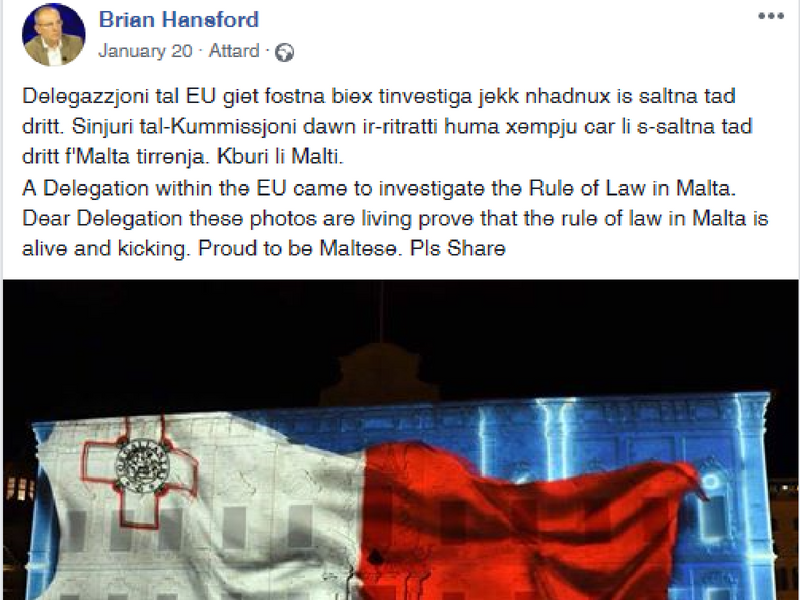
Others simply confused it with “ruling”, or threw it about as a justification for harassment.
In using and abusing the term rule of law with increasing frequency, the government and Labour Party propagandists are aiming for the expression to slowly lose its meaning and impact. Indeed, the term rule of law is slowly being repurposed as a branding for critics rather than the democratic ideal that it actually is.
Pursue others
Recently, with the publication of selective parts of the Egrant inquiry, the narrative has now changed to a hounding of critics. The way it has been handled is a crass affront to the rule of law:
- The police awaited the Prime Minister’s “request” to commence investigations and even then they offloaded it onto a magistrate,
- The AG’s sharing of the full report with both the subject of the inquiry and others at OPM, which includes persons forming the subject of related inquiries thus exposing names of witnesses and evidence is in itself a crass affront to the rule of law.
Or waving the rule of law around as though the Egrant inquiry erases the past two years since the spectacular implosion of facades after the Panama Papers.
The aim is simple – prepare the nation for the next round of visits by the LIBE Committee and prepare a narrative.
The Maltese government has not meaningfully addressed any of the recommendations from the previous LIBE fact-finding mission, so we have yet to face more of the above tactics by the government to control the agenda.
Read more: Disinformation Watch

